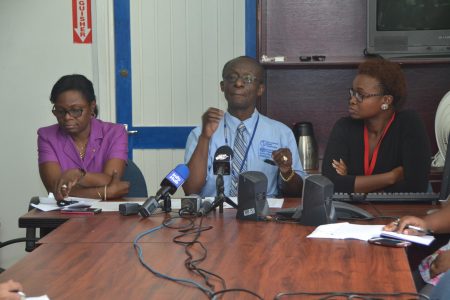The Pan American Health Organization (PAHO) and World Health Organization (WHO), in collaboration with the Ministry of Public Health announced plans yesterday to have approximately 36,000 girls here between the ages of 9-16 years immunized with the HPV vaccine.
According to a press release from the Department of Information (DPI), representatives from PAHO/WHO and the Public Health Ministry, at a press conference yesterday said that the team is aiming to distribute approximately 40,000 doses of the vaccine among young girls across the regions of Guyana, with 16th October, 2017 earmarked as the commencement date for the campaign.
PAHO/WHO Representative, Dr. William Adu-Krow, according to the DPI release, said that the Human Papilloma Virus (HPV) vaccine is the best chance of preventing cervical cancer.

Ministry of Public Health, Maternal & Child Health Officer (ag.), Dr. Ertensia Hamilton, in her presentation, said with the goal of reducing cervical cancer locally, they will be partnering with a number of stakeholders.
“We will be working in conjunction with the Ministry of Education to immunize girls in school. We have already begun the partnership with our private pediatricians for mothers who do not want to take their child to have the vaccine at school… and for all girls that we cannot reach… [we aim] to have outreach activities in the regions … so that we can get every girl within that age group immunized,” Hamilton was quoted in the press release, as saying.
Dr. Adu- Krow said, according to PAHO/WHO and Public Health data reviews, cervical cancer is the second most common cancer among Guyanese women, adding,
“In Guyana, during the period 2003 – 2012, Guyana recorded 6,518 new cases of cancers for an overall cumulative incidence rate of 867.7 per 100,000 populations. Of the 3,956 sixty percent were females and 2,561 thirty nine percent were males, giving a female to male ratio of 1.54:1,” Dr. Adu-Krow was quoted in the statement as saying.
The PAHO/WHO representative, according to the DPI release, revealed that Indo-Guyanese were found to have the largest proportion of cases at forty seven percent, followed by Afro-Guyanese at thirty percent, and eleven percent among mixed races.
It was noted that male cases outnumbered female cases, at fifty two percent and forty eight percent respectively.
The HPV Vaccine is said to be the most effective way of preventing cervical cancer, and has lifelong protection.
It is most effective among girls between the ages of 9-16 with a minimum of two doses being administered.
Though the Public Health Sector does not have the equipment to conduct HPV testing, Dr. Hamilton advised that there are PAP smears and VIA screenings available for persons over the age range, and those who are already sexually active, the statement said.
In relation to the immunization of boys, Dr. Hamilton said the team will look to vaccinate boys in the future.
The HPV vaccine arrived here in 2011 and was officially launched by the then Ministry of Health in 2012. It was relaunched again in 2016 under the now Ministry of Public Health in collaboration with Merck, Sharp and Dhome (MSD).





